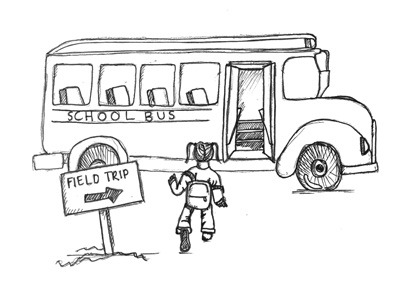Academic Field Trips Fuel Student Learning

Alton Jones, Tri-County High School and the Museum of Fine Arts are all memorable field trips for Walpole middle schoolers. Both Bird and Johnson Middle Schools hold field trips for students to enjoy and further develop their class material outside of the classroom. Though elementary and middle schools often incorporate field trips throughout the school year, high schoolers do not have as many opportunities to take academic trips with their entire grade. By having fewer field trips, students are deprived of the benefits that trips outside of the classroom have to offer. Although organizing field trips often poses as a difficulty due to students missing essential class time, the benefits they provide far outweigh the drawbacks.
Though Walpole High School does offer many field trips, the trips taken are primarily class or club specific. Street Law classes travel to the Norfolk County Prison to further their understanding of criminal justice. Journalism attends conferences from the New England Scholastic Press Association held at Boston University. The art, music and TV departments hold field trips that coincide with the material students are learning in class. Honors Latin and AP Environmental Science are two of the few academic classes that offer field trips. Since many students do not take these specific classes, many are excluded from the opportunity of these engaging academic trips.
Similar to the memorable field trips of the middle schoolers, an unforgettable trip for the Walpole high schoolers is the sophomore US History I trip to the Freedom Trail in Boston. This field trip includes the entire grade, allowing each student an equal opportunity to attend the trip, regardless of their class level. Walpole High students benefit from their trip to the Freedom Trail, as they are able to see the material they are learning about in class in person and can connect their knowledge to the historical monuments in Boston. By doing so, students can have a more tangible grasp on the information they learned in class, information that may be difficult to wrap their heads around without seeing it for themselves. Not only does this trip benefit the students’ academic understandings, but by taking the entire grade, the students gain a sense of community with their classmates as they all experience the trip together. Students rarely have a chance to convene as an entire grade for something other than an assembly, which does not allow for a sense of community; therefore, field trips should be taken advantage of when possible not only for academic reasons but also as a means of community bonding.
Though field trips can be difficult to organize, as the teachers have to complete a significant amount of paperwork to take the students out of the classroom, the benefits far outweigh the disadvantages. The academic opportunities and the sense of community formed, especially between the seniors as their time together comes to an end, is priceless.
Walpole High School should consider the opportunities that grade-based academic field trips present for both students and teachers. By holding academic field trips for entire grades, no students would be excluded due to the level of or elective classes they take. Everyone would have an equal opportunity to attend a field trip outside of the classroom. Between Monday and Friday, most high school students spend at least 35 hours in the school building. By utilizing spaces outside of the classroom, teachers and students have a break from their everyday routine and learn unique ways to apply their class material. Students should visit a museum, go on a hike, see a play at a theatre or even attend a poetry reading to enrich different aspects of their academic classes. Seniors have more flexibility at the end of their school year and could afford an enjoyable class field trip to the beach as their time together comes to a close. Being so close to Boston, Walpole High should take advantage of places like the Museum of Fine Arts, the Children’s Museum and the Boston Aquarium. Even local places, such as Blue Hills and Wards Berry Farm, provide students with unique, creative outdoor learning experiences. By holding grade-based trips, each student would have the opportunity to experience the hands-on learning aspect field trips offer. Also, students who struggle with traditional notes, quizzes and tests could gain new perspectives by seeing the class material presented in a different way. Students and teachers can have a break from their school days while still learning new information and gaining real-life perspectives. Field trips also excite students in ways that a traditional school setting could not, and any time students are excited about learning is a time that should be taken advantage of.
Though field trips are often difficult to coordinate and may result in missing class time, there are worthwhile opportunities for students to not only bond as a grade but make real-life connections to class material.

Callie Ross, class of 2019, is a third year opinion editor for The Rebellion. At Walpole High School she participates in best buddies. Outside of school,...










